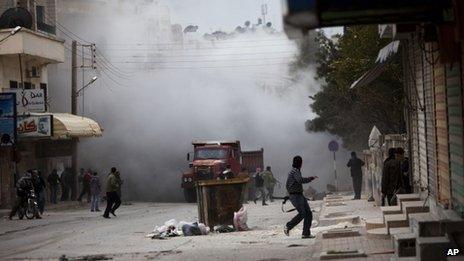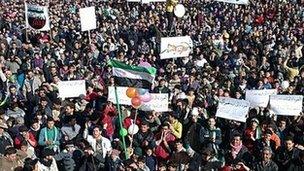Syrian opposition's failing military tactics
- Published
- comments

Reports suggest that opposition fighters have been forced out of the city of Idlib, close to the Turkish border in northern Syria.
Following on from their abandonment of the Baba Amer district in Homs, it has prompted resignations in the rebel leadership as well as questions over their poor judgement in trying to hold ground, inviting large scale government military operations in response.
The question of when it is right to establish liberated zones or when it is better to melt away, avoiding a stand up fight with all the suffering that this would cause the civilian population, has preoccupied revolutionaries for decades. The advantages, in terms of setting up an alternative to a hostile government are evident - but so are the dangers in allowing the enemy to hammer a static guerrilla force or devastate areas that support the rebellion.
When Mao led his communist army on its "Long March" in China in 1934, it was a struggle for survival prompted by the encirclement of a "liberated area" that his critics said he had declared prematurely.
Che Guevara debated the Liberated Zone concept with Fidel Castro, and in their war against the Soviet army, the mujahideen at times proclaimed parts of Afghanistan, such as the Panjsher Valley to be free too.
'Chaos'
In the case of Syria, the loose coalition of armed groups that has challenged the Assad government lacks the tight organisation of some of those earlier movements, so the decision to hold certain areas was often an impromptu one by people on the ground.
Resigning from the Syrian National Council, the umbrella body for the anti-government movement, as a result of these recent setbacks, Haitham al Maleh said today, "there is a lot of chaos in the group and not a lot of clarity over what they can accomplish right now".

Anti-government protests had taken place in the north-western city of Idlib
There are recriminations aplenty in Turkey where the Council and the Liberation Army are based, with further resignations expected. Many of those connected with the movement have blamed recent failures on a lack of weaponry, but the more salient deficit is in organisation and leadership.
It was precisely in those areas that Britain extended aid to the Libyan revolutionaries, and where experts in Whitehall now assess the Syrians' need to be greatest.
The SLA has tens of thousands of members - perhaps as many as 50,000. They are armed for the most part with small arms (ie assault rifles, light machine guns and rocket propelled grenades) though in places they have deployed mortars, captured anti-tank missiles and even tanks brought over by defectors.
They have succeeded in knocking out many government armoured vehicles, and encouraging the defection of thousands of government soldiers - indeed it was as a haven for such men that the opposition last year declared the area between the Turkish border and Idlib to be liberated.
'Shaky morale'
Much of the anger directed against the Syrian National Council (SNC) has centered on the issue of weapons supplies, or the lack of them.
George Sabra, the SNC spokesman claimed earlier this week that a bureau had been set up to channel weapons to fighters inside Syria. However no real evidence has yet emerged of fighters obtaining heavier or more sophisticated arms than those already available.
Furthermore, the arrival of a few dozen satellite phones or secure short wave radios might have a greater effect on the SLA's capabilities than any number of kalashnikovs.
While the SLA claims to have a command structure that might make use of such communications means - for example to coordinate attacks in certain areas in order to draw government forces away from somewhere like Homs or Idlib - there is little sign that it actually functions.
There are many factors that ought to play into the hands of the opposition - from widespread popular support to large numbers of armed volunteers and the shaky morale of state forces.
Yet during the past few weeks the government has exploited its advantages of organisation and heavy weaponry to inflict some sharp reverses on opposition groups despite the fact that they can only rely on a small number of loyal military units.
The perception of a poorly organised resistance has played into the deliberations of Western governments debating whether or not to intervene more actively in Syria.
Increasingly these failings appear to be exacerbating tensions within the opposition leadership itself.